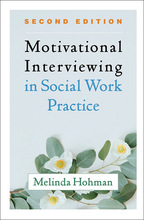Motivational Interviewing in Social Work Practice
Second Edition
Melinda Hohman
New to This Edition
- Expanded and restructured around the current four-process model of MI (engaging, focusing, evoking, and planning).
- Content is explicitly linked to the Council on Social Work Education's Educational Policy and Accreditation Standards (EPAS) and the Grand Challenges for Social Work.
- Chapter on MI through the lens of critical race theory.
- Chapter on innovative applications in the areas of trauma, food insecurity, and environmental justice.
- Additional pedagogical features—“Voices from the Field” boxes written by social workers in a variety of roles, and end-of-chapter reflection questions.
This title is part of the Applications of Motivational Interviewing Series, edited by Stephen Rollnick, William R. Miller, and Theresa B. Moyers.
“There is so much to love about this text. I teach two full semesters of MI to master’s-level social work students each year and the first edition of this book has been required reading. I look forward to using the second edition in my MI classes, and I also plan to incorporate it into my courses on substance use disorders. The second edition integrates the latest research on this respectful, empathic approach and brings it to the very practical world of the social worker, pairing specific content with the field’s ethics and standards for accreditation. It highlights current issues such as critical race theory, virtual service delivery, and the Grand Challenges for Social Work. The writing style is warm and accessible and every chapter is rich with relevant examples.”
—Mary Marden Velasquez, PhD, Centennial Professor in Leadership for Community, Professional, and Corporate Excellence, and Director, Health Behavior Research and Training Institute, Steve Hicks School of Social Work, The University of Texas at Austin; member, Motivational Interviewing Network of Trainers (MINT)
“Structured for graduate social work education, this terrific addition to the MI literature would also be valuable for counseling and psychology students, as the explanations and applications of MI are exemplary. Hohman, the leading social work scholar in the MI field, has provided a significant gift at a time when we all need one. Highlights of the text include narratives written by social workers applying MI in innovative and powerful ways. The book makes the latest developments in MI scholarship accessible, and will enable readers to extend their knowledge of this approach and achieve more success for their clients.”
—Richard P. Barth, PhD, MSW, University of Maryland School of Social Work
“A ‘must read’ for social work educators who are interested in preparing the next generation of social workers for counseling and consulting with clients about behavioral change!”
—David L. Albright, PhD, MSW, Professor of Social Work and Hill Crest Foundation Endowed Chair in Mental Health Research, The University of Alabama School of Social Work
“While written for social work practitioners and students, this book extends a welcome invitation to all practitioners, making MI accessible, comprehensible, and relevant. Hohman shows how MI can be used in a wide range of settings and with culturally diverse persons. Examples from Hohman’s own practice and teaching are integrated throughout, and sample annotated dialogues articulate MI-consistent skills. The book situates MI in multiple theories of human behavior and motivation. The second edition extends MI into environmental work, trauma-informed practice, and food insecurity, and the entire chapter devoted to critical race theory is an essential contribution.”
—Cynthia J. Osborn, PhD, Counselor Education and Supervision, Kent State University; member, Motivational Interviewing Network of Trainers
Table of Contents
I. Introduction
1. Why Social Work and Motivational Interviewing? 
2. The “How” of Motivational Interviewing
II. Elements of Motivational Interviewing
3. The Engaging Process: Building Trust
4. Focusing: A Conversation about a Conversation
5. Evoking: Change Talk as the Driver of Change
6. Client Discord: A Time to Re-Engage
7. Sharing Information and Advice
8. Planning: Determining the Path Forward
III. Implementation
9. Integrating Motivational Interviewing into Social Work Practice, with Cristine Urquhart & Fredrik Eliasson
10. Motivational Interviewing through the Lens of Critical Race Theory
11. Innovative Applications of Motivational Interviewing
12. Teaching and Training Motivational Interviewing
References
Index
About the Author
Melinda Hohman, PhD, MSW, is Professor and Director Emeritus in the School of Social Work at San Diego State University. Before retiring in 2018, she taught courses in social work practice, substance abuse treatment, and motivational interviewing (MI), at both the graduate and undergraduate levels. Dr. Hohman’s research interests include substance abuse assessment and treatment services and the learning of MI. She has been a member of the Motivational Interviewing Network of Trainers (MINT) since 1999, training community social workers, child welfare workers, probation officers, and addiction counselors, among others, across the United States and internationally. She has served as a MINT Trainer of Trainers.Contributors
Cristine Urquhart, MSW, RSW, Trail, BC, CanadaFredrik Eliasson, B.Sc, Lund, Sweden
Audience
Social workers in any practice setting or specialty area; social work students and instructors.Course Use
Serves as a text in advanced undergraduate- and graduate-level courses such as Social Work Practice Skills, Interviewing, Social Work and Substance Abuse, and Motivational Interviewing in Social Work.Previous editions published by Guilford:
First Edition, © 2012
ISBN: 9781462523696
New to this edition:
- Expanded and restructured around the current four-process model of MI (engaging, focusing, evoking, and planning).
- Content is explicitly linked to the Council on Social Work Education's Educational Policy and Accreditation Standards (EPAS) and the Grand Challenges for Social Work.
- Chapter on MI through the lens of critical race theory.
- Chapter on innovative applications in the areas of trauma, food insecurity, and environmental justice.
- Additional pedagogical features—"Voices from the Field" boxes written by social workers in a variety of roles, and end-of-chapter reflection questions.
